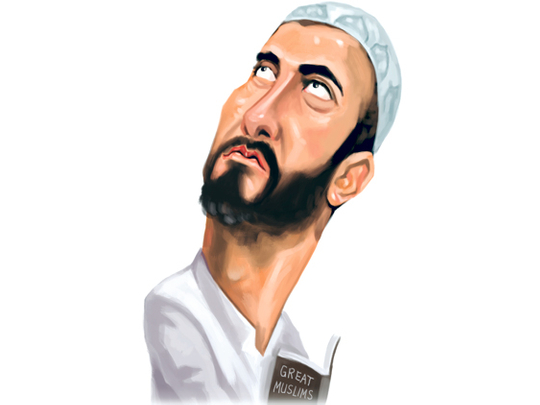
An idea can change the world. Who would know this better than the people of the UAE? This young nation is a living, thriving tribute to the compelling power of simple, yet magical ideas. The restless energy and enterprising spirit of the Emirates to constantly break new ground and build something new and refreshing in this long dormant, sleepy part of the world often reminds me of the pioneering spirit of early Arabs and Muslims.
A great deal has been written about the stark simplicity and honesty of the early believers and how the rustic, desert tribes started conquering the world within two decades of the dawn of Islam. What fascinates me no end though is their seminal contribution to modern science and all streams of pursuit of knowledge. From astronomy to anatomy to medical science and from mathematics to chemistry to physics to navigation and from philosophy to poetry, Muslims have not just left an imprint on modern science, they have shaped our world.
Did you, for instance, know that it was an Arab woman, Fatima Al Fihri, from Morocco who founded the world's first university? Or the fact that the blueprint of the modern camera was created by an Iraqi scientist, Ibn Al Haitham, more than a thousand years ago? He wrote the Book of Optics that led to the invention of the camera.
How many of us, accustomed to the comfort and speed of air travel, realise that the idea had been first tried by a curious pioneer called Abbas Ibn Firnas? With his body covered in feathers and ‘wings' strapped to his arms, the Berber polymath took to the sky in 9th-century Cordoba, managing to ‘fly' several metres before crash landing. It was clearly a work in progress! But remember it happened a thousand years before the Wright brothers attempted their flight.
New York these days is hosting an unusual exhibition profiling hundreds of such pioneers, from Ibn Firnas to Ibn Sina, in a long due tribute to the contributions of Islamic civilisation. ‘1001 Inventions: Discover the Muslim Heritage in Our World' that opened in the Big Apple last month after immensely successful shows in London and Istanbul attracting 800,000 visitors is an attempt to recreate the glory of the magical millennium, from AD 700 to 1700, that changed the world.
It was during this period between the fall of Rome and the rise of the European Renaissance, that Muslim civilisation led the world in science and technology and virtually everything else.
Endless list of inventions
From the humble coffee beans to the crafty game of chess to windmills to clocks to fountain pens to soap to surgical instruments and from quilting or sewing to gunpowder, the list of Muslim inventions is endless. Five hundred years before Galileo discovered earth was round and was duly punished for it by the Church, the Muslim scientists had established the spherical nature of the planet.
In the empire of the faith that stretched from Spain through the Middle East to China, new ideas were constantly generated, encouraged and embraced. It's this ferocious hunger for knowledge that took the Arabs and Muslims to great heights of power, prosperity and intellectual supremacy. They fought the battle of ideas from a position of strength, challenging reigning ideas and ideologies of the time.
They embraced the best from around the world. This was how the science of arithmetic from India and Greek philosophy were passed on to Europe and the rest of the world. Indeed, the Arab contribution played a critical role in the progress the West has made over the past five centuries.
A culture of excellence coupled with their willingness to learn enabled the Muslims to conquer new lands. Muslim countries were home to scores of universities and libraries long before Oxford and Cambridge were founded in Europe.
When the Mongol armies overran the Middle East, sacking eminent centres of power and learning like Baghdad, Damascus and Alexandria and killing hundreds of thousands of people, there was more ink than blood in rivers. The invaders burnt and dumped in the river hundreds of thousands of invaluable books and rare manuscripts authored and collected over the centuries.
How would you then explain the current intellectual stagnation? Why aren't Muslims part of the knowledge revolution anymore, let alone leading it? Have they run out of steam as a people and as a civilisation?
It's no coincidence that power began to slip from Muslim hands just when they stopped exploring and expanding new horizons of knowledge. Muslims haven't produced one intellectual or scientist of the stature of Ibn Rushd (Averroes) and Ibn Sina (Avicenna) in the past many centuries.
Why? Because the movement of knowledge and ideas that once drove Muslims and fired their imagination has lost itself somewhere. A small European nation or a backward Indian state boasts more universities today than all the Arab world put together.
All we do these days is spend all our time and energy on pointless delusions of grandeur and fruitless debates. Instead of doing something concrete to lift ourselves out of the intellectual morass we are stuck in, we are busy issuing fatwas condemning each other.
There's no dearth of talent or resources, human or material, in the Muslim world today. What it needs is original ideas and men who could translate them into reality. More important, what is needed is an opening of minds.
Aijaz Zaka Syed is a Dubai-based writer who has extensively written on Muslim world affairs.









